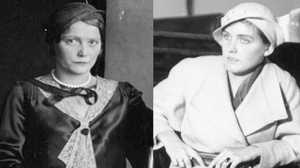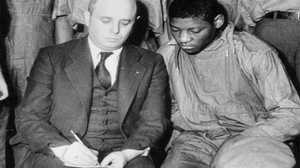The Scottsboro Judges
Judge James Edwin Horton Jr., 1878 - 1973.
Justitia fiat coelum ("Let justice be done though the Heavens may fall." -- Paternal grandfather's motto
James Edwin Horton Jr. was born in Tennessee in 1878, the son of a former slave owner. He studied medicine at Vanderbilt for a year and then received a B.A. and Bachelor of Law at Cumberland University, in 1897 and 1899. His father was a probate judge and Horton clerked for him before entering private practice. He served for one term in the Alabama State Legislature (1910-14), and then served in the State Senate. When a chancery court seat opened, he left the senate to fill that seat. After returning for a while to his law practice and the land he farmed, Horton was elected judge of the Eighth Circuit Court in 1922. In 1933 he was in his second six-year term.
Horton was praised by the prosecution and defense alike when he was named to judge the second trial of the Scottsboro defendants in Decatur, Alabama. His lean, lanky physical appearance was often compared to Lincoln's, and he was considered extremely fair-minded.
For Haywood Patterson's second trial, Horton welcomed the press into his courtroom, even shaking the hands of two African American journalists. He listened carefully to the witnesses, even, as was his habit, coming around his bench to look at their faces as they spoke. Horton may have been particularly impressed by the medical testimony of Dr. R. R. Bridges, the physician who had examined Victoria Price and Ruby Bates hours after the incident. Bridges' associate, Dr. Marvin Lynch, asked not to testify, but in a private meeting with Judge Horton told him that he did not believe the women had been raped. Horton later recalled his response: "My God, Doctor, is this whole thing a horrible mistake[?]" The judge implored him to take the stand, but Lynch was reluctant to jeopardize his young career.
Later in the trial, when reports of a possible lynch mob reached the judge, he excused the jury and addressed the court: "I say this much, that the man who would engage in anything that would cause the death of any of these prisoners is a murderer; he is not only a murderer, but a cowardly murderer... I absolutely have no patience with mob spirit.... Your very civilization depends upon the carrying out of your laws in an orderly manner."
Still later, instructing the jury, he said: "You are not trying whether or not the defendant is white or black -- you are not trying that question; you are trying whether or not this defendant forcibly ravished a woman."
"You are not trying lawyers, you are not trying State lines; but you are here at home as jurors, a jury of your citizens under oath sitting in the jury box taking the evidence and considering it, leaving out any outside influences."
The jury sentenced Patterson to death.
In the days that followed, Judge Horton read the sentence into the record, and then postponed further trials due to the inflamed atmosphere in the town.
Editorials, telegrams and letters of all opinions flooded Horton's court, praising his equanimity, condemning his tolerance for Samuel Leibowitz, excoriating the verdict that was reached in his courtroom and warning him against reversing the jury's decision. One visitor suggested that if Horton dared annul the jury's verdict, his re-election in 1934 would be in doubt. "What does that have to do with the case?", he asked with a smile.
On June 22, 1933, Judge Horton convened his court. Expecting it to be a filing for a new trial, the first step for an appeal to higher courts, Leibowitz did not attend. But instead of listening to a motion, Judge Horton read a remarkable disputation of the verdict and concluded by calling for a new trial for Patterson. In a recent interview, one of Horton's sons described his father's speaking style as somewhat awkward, but his written decision is a model of logic and eloquence.
The Supreme Court of Alabama took Horton off the case and delivered it to Judge Callahan. As predicted, Horton lost his bid for re-election the following year. He retired to his land, a villain to some, a hero to many.
Further information on the Scottsboro cases heard by Judge Horton, including excerpts from testimony, are available on Professor Douglas Linder's Famous American Trials Web site at the University of Missouri - Kansas City Law School.
Judge William Washington Callahan (1863 - 1947):
"Where the woman charged to have been raped, as in this case, is a white woman, there is a very strong presumption under the law that she will not and did not yield voluntarily to intercourse with the defendant, a Negro. And this is true whatever the station in life the prosecutrix may occupy, whether she be the most despised, ignorant and abandoned woman of the community, or the spotless virgin and daughter of a prominent home of luxury and learning."
-- Charge to the jury, Haywood Patterson trial, 1933
William Washington Callahan was born June 30, 1863 on a farm in Alabama. His formal schooling ended with high school, but he read law in the office of W. P. Chitwood, and worked as a lawyer and state representative before being elected as a judge in 1928.
After Judge James Horton was asked to step down from the Patterson case, all the Scottsboro cases were transferred to Judge Callahan's court. Unlike Horton, Callahan forbade cameras in his courtroom ("There ain't going to be no more picture snappin' round here," he declared) and made clear that the press was much less welcome. Callahan tried to keep the case as straightforward as possible, limiting many of defense attorney Samuel Leibowitzobjections and sustaining most of the prosecution's objections of Leibowitz -- and even chiming in with a few objections of his own.
On the subject of Victoria Price's virtue, or lack thereof, Callahan objected to lines of questioning that impugned her reputation. When Leibowitz inquired as to who accompanied Price on the train, Callahan objected, "I can't allow the time of the court wasted on matters so immaterial. You mustn't ask that question again." When Leibowitz continued to ask about the night previous to the alleged rape, Callahan said: "That is far enough for me to know all I want to know, to know that the question is illegal," and admonishing Leibowitz: "The more I shut you off the better shape you're in." Avoiding the background of a rape victim is a position still taken in contemporary rape cases; however, this left only one explanation for the medical reports that indicated the presence of semen in both women. Patterson was convicted of the crime.
All the other Scottsboro trials brought before Judge Callahan ended in the convictions of the defendants. As talk grew of a potential compromise in the case, Judge Callahan made clear that he was not supporting such an outcome, that he would not accept a "fifty-dollar fine for rape." In 1937, the prosecution dropped the charges against five of the black defendants, and changed the charge against Ozie Powell to assault on a deputy. Callahan, disregarding the six years Powell had already spent in jail, sentenced him to the maximum, twenty years.
Further information on the Scottsboro cases heard by Judge Callahan, including excerpts from testimony, are available on Professor Douglas Linder's Famous American Trials Web site at the University of Missouri - Kansas City Law School.







